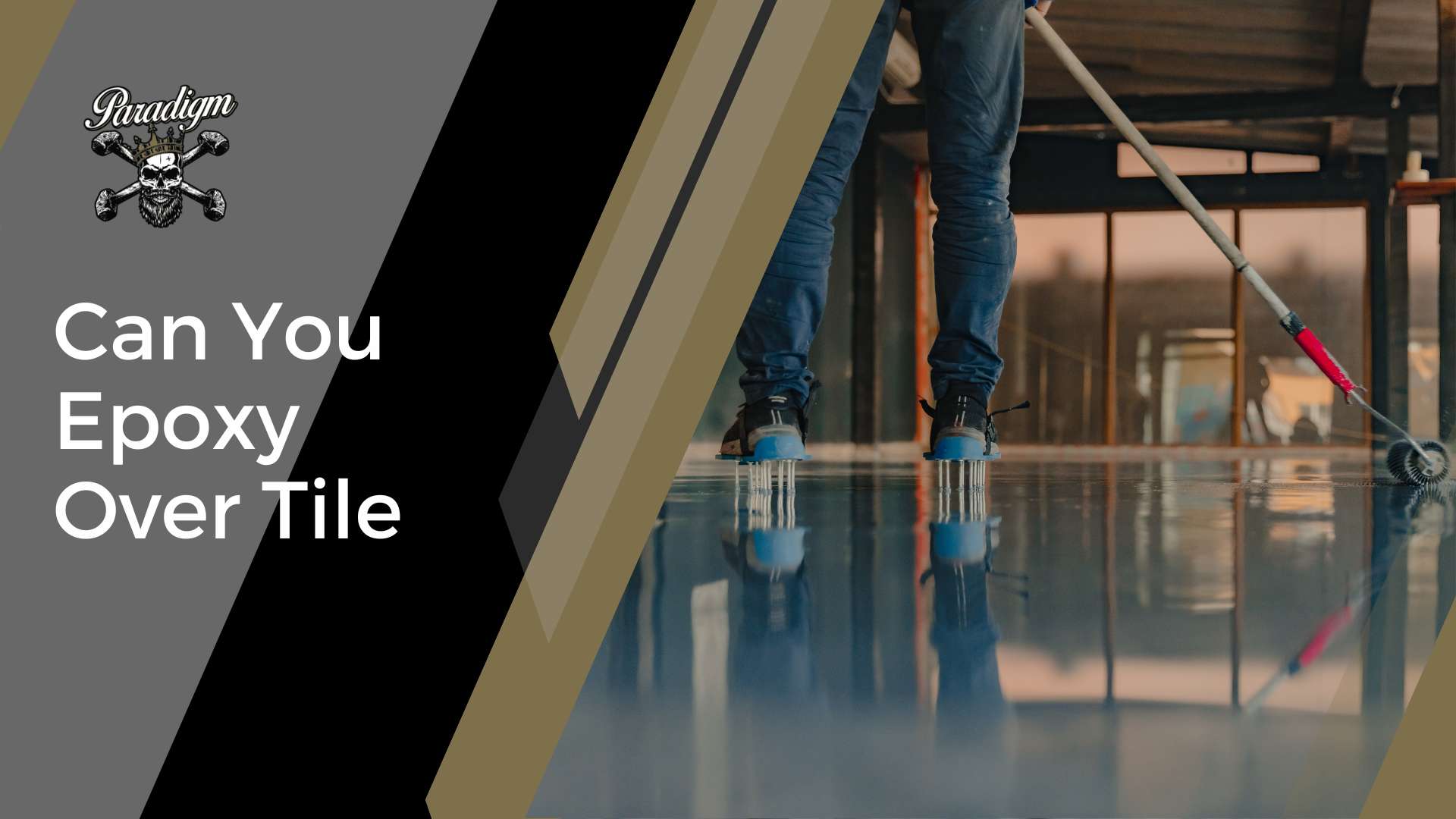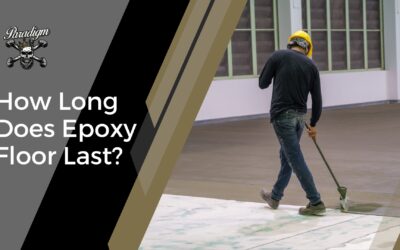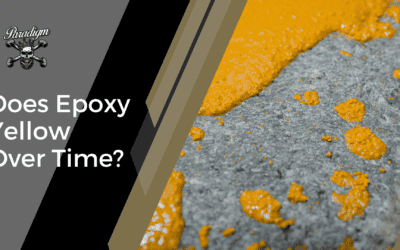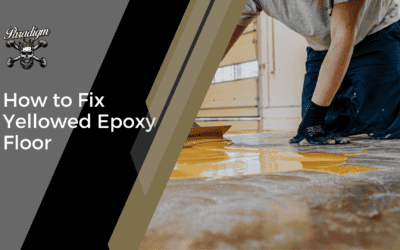Epoxy coatings are taking over the flooring market, and it is no surprise. They are durable and very versatile for many home improvement projects. So, if you already have tiles on your floor, you may want to know if you can epoxy over tile.
With proper floor preparation, epoxy can be applied to the tile surface. To ensure proper adhesion, you must clean, dry, and etch the tile. Also, the grout condition and other factors should be considered. Epoxy can be used for many applications, including coating surfaces such as tiles, countertops, and floors.
While tiles have always been the popular flooring choice, the easy-to-clean finish of epoxy flooring seems to be attracting more people. This attraction leaves everyone wondering how to transition from tile to epoxy easily.
Table of Contents
What Is Epoxy Coating?
Epoxy coating is a mixture of both epoxy resin and hardener that forms a protective layer over a surface. When you apply epoxy to surfaces like floors, tiles, walls, and countertops, it hardens to create a durable and seamless finish that is resistant to stains, impact, abrasion, and chemicals.
Epoxy coating is simply the result of a chemical reaction between two components. Its beauty and easy maintenance make it popular for both residential and commercial use. Not only are epoxy coatings beautiful, but they are also waterproof.
What Are The Benefits Of Epoxy Coatings?
The critical benefit of epoxy coatings is their exceptional durability, but they also offer other advantages.
The following are the benefits of epoxy coatings over other flooring options:
- Durability: epoxy coatings have a high resistance capacity to chemicals, stains, abrasion, and impact. This resistance makes them perfect for high-traffic surface areas.
- Aesthetics: Epoxy coatings have different colors, patterns, and finishes. This variety allows you to customize your designs to suit your taste and increase the beauty of your surface. Whether you prefer a glossy or matte finish, epoxy coatings can transform the overall look of your tiles, giving them a modern and polished appearance.
- Easy maintenance: They are easy to clean and do not require much maintenance. The surface does not easily scratch. It also creates a seamless surface with no grout lines that will trap dirt, dust, and grime over time.
- Waterproof: Epoxy coatings are waterproof, making them perfect for moist areas like bathrooms and kitchens. The epoxy creates a barrier and prevents water from sipping into the ground.
Can You Epoxy Over Tile?
You can epoxy over tile, but it needs very careful preparation to ensure durability and adhesion. You have to prepare the surface properly by cleansing the dirt and ensuring that your tiles are dry. In some cases, you may need to etch the tile surface to create a rough texture to grip the epoxy coating and help it stick.
The condition of your tile grout line is also critical when epoxying over tile. Cracks and dents on the tile will affect the structural integrity of your work. Epoxying over tiles wrong can ruin your surface, making you wish you never made the decision.
What Are The Factors To Consider While Epoxying Over Tile?
Epoxying over tile is tricky, and special attention is needed to get it right.
The following are some factors to consider before applying epoxy over your tiled floor:
- Tile Condition: It is crucial to assess the condition of the existing tile before applying epoxy. Ensure that the tiles are intact, without any cracks, chips, or loose pieces. These imperfections can compromise the overall adhesion and longevity of the epoxy coating. If you notice any damage, repair it before application to ensure a smooth and even application.
- Tile Material: The type of tile also affects compatibility with epoxy coatings. Ceramic or porcelain tiles generally provide a better adhesion surface than natural stone or glass tiles. It is important to conduct a test patch to ensure compatibility and adhesion. The test will help you determine if the epoxy adheres well to the specific tile material.
- Surface Preparation: Proper surface preparation is crucial to achieving optimal adhesion and a long-lasting finish. Before applying epoxy over the tile, thoroughly clean the surface, removing any dirt, oils, or residues. A clean surface will ensure better adhesion. In addition, roughen the surface by sanding or etching it. The etching creates a better bonding surface for the epoxy coating, allowing it to adhere more effectively.
- Moisture and Temperature: Epoxy coatings may not adhere properly to damp or extremely cold surfaces. Ensure that the tile surface is dry and at an appropriate temperature for optimal bonding. The manufacturer’s guidelines provide specific recommendations regarding humidity and temperature conditions.
- Grout considerations: Although epoxy can be applied over both tile and grout, it is necessary to check the condition of the grout lines. Cracked, discolored, and deteriorated grout lines may ruin the strength of the epoxy coating. It is better to seal the grout with a grout sealer or regrout it before applying the epoxy coating.
Pros of Epoxying Over Tile
- Epoxying is cost-effective. It removes the need to remove and replace existing tiles, saving time and money on your renovation project.
- It offers endless design and creative possibilities. You have a choice ranging from solid colors to very intricate patterns and even textures. You can personalize your space to any taste that suits you.
- The epoxy layer adds an extra protective layer. Although tiles are durable and often resistant to damage and stains, epoxy reinforces that resistance, reducing maintenance requirements.
- Epoxy coatings give a seamless and uniform surface finish. Unlike tiles, they do not form grout lines that can trap dirt and grime. This uniform surface increases hygiene and makes cleaning easier.
Cons of Epoxying Over Tile
- Epoxy coatings are also prone to weathering under harsh conditions and eventually wearing or chipping. The epoxy finish needs periodic recoating, especially in areas with high traffic.
- If the surface is not prepared correctly or the tiles are not compatible, the epoxy will not adhere. Lack of adhesion will lead to the epoxy coating peeling, flaking, or bubbling.
- Sometimes, epoxy coatings may mirror the imperfections in the tile surface. The uneven tiles and grout lines may show, especially if they need to be correctly fixed during preparation.
- Once an epoxy coating is applied to a surface, it is difficult to reverse the process. Epoxy coating is for long-term renovations.
How To Apply Epoxy Over Tile
Applying epoxy over tile will enhance the appearance of your space and increase its durability and protection, but you need to know how to apply it correctly.
The following are the DIY steps to apply epoxy over tile:
- Prep surface: Prepare the surface by cleaning the tile with dirt. Make sure it is dry, and check for chips and cracks. You can use a grout sealer to seal the grout and ensure your epoxy comes out clean. Make sure your tile is flat and firm. If it is not flat and strong, you can remove and retile that spot.
- Mix the epoxy: Mix the epoxy resin and hardener. Follow the recommended ratio to ensure proper curing and adhesion.
- Applying the Epoxy: Use a brush or roller to apply a thin, even coat of epoxy to the tile surface. Start from the edges and work your way toward the center, ensuring complete coverage. Take care not to apply the epoxy too thickly, as it can lead to uneven curing and pooling.
- Allowing the Epoxy to Cure: Once the initial coat is applied, allow it to dry according to the manufacturer’s guidelines. The curing time typically takes several hours. After the initial coat has cured, you can assess if a second coat is necessary. Apply the second coat in the same manner as the first, ensuring even coverage and avoiding pooling.
- Final Curing Process: Allow the final coat of epoxy to cure completely before using the surface heavily or placing objects on it. The curing time can vary depending on the specific epoxy product used, so be sure to follow the manufacturer’s instructions.
Epoxy coating can be successfully applied over tile surfaces, provided essential considerations and preparations are made beforehand.
Can I Epoxy Over Any Type Of Tile?
You can apply epoxy to most tile types, such as ceramic, porcelain, and stone. However, it is vital that the tile surface is clean, free of dirt, and, most importantly, dry.
Do I Need To Prepare The Tile Surface Before Applying Epoxy?
Yes, you have to prepare the tile surface before applying epoxy. If the tile surface is not well prepared, your epoxy may not have proper adhesion.
Can I Epoxy Over Cracked Or Damaged Tiles?
It is not recommended to apply epoxy over creaked or damaged tiles. These imperfections ruin the integrity or strength of the epoxy coating. Replace all damaged tiles before applying epoxy coating for a smooth and durable finish.
Do I Need To Seal The Grout Before Epoxying Over Tile?
You do not necessarily need to seal the grout before epoxying over the tile, but it is an excellent way to ensure the strength of the epoxy along the grout lines. It also helps prevent moisture penetration and increases the durability of the coating.
How Long Does It Take For Epoxy To Cure On Tile Surfaces?
The curing time frame varies due to factors such as humidity, temperature, and epoxy product, but it generally takes around 24-72 hours.
Can I Walk On Epoxy-Coated Tile Surfaces Immediately After Application?
Do not walk on epoxy-coated tiles immediately after application. While they may feel dry for a few hours, they are not fully dry. Wait at least 24 hours before walking or placing heavy objects on the newly coated surface.
How Do I Maintain Epoxy-Coated Tile Surfaces?
You can maintain epoxy-coated surfaces by cleaning them with a mild detergent and water. Do not use abrasive cleaners or scrubbing pads; they can damage or scratch the epoxy finish. Epoxy surfaces do not require heavy maintenance; sweeping and mopping are enough. If well maintained, epoxy floor lasting time can reach 5 to 20 years.




